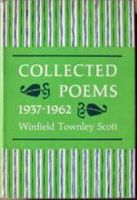Winfield Townley Scott (1910-1968) (From the Literay Enclycopedia)
Poet, Journalist, Diarist.
Born 1910; died 1968. Active 1930-1968 in USA, North America
Article contributed by
Charles, William Behlen, None
Although Winfield Townley Scott belongs to that generation of American poets who were the first to inherit the Modernist legacies of Ezra Pound, T. S. Eliot and William Carlos Williams—a generation which included John Berryman, Elizabeth Bishop, Randall Jarrell, Robert Lowell, Muriel Rukeyser, and Delmore Schwartz—he ultimately allied himself with the pre-moderns; Robert Frost and Edwin Arlington Robinson. Like them, he excelled at dramatic monologue and literary portraiture. What Scott shared with the Moderns, primarily William Carlos Williams, was an ear tuned to the music of American speech.
Like his contemporaries Lowell and Bishop, Scott often sought a prosodic middle ground between fixed iambic meter and free verse. However, he avoided the stylistic eccentricities of Berryman, the overt erudition of Schwartz and Rukeyser’s belief that the poet should ally his or her muse with political solidarities. Like Randall Jarrell, Scott wrote some of the most powerful poems to come out of World War Two, namely “The American Sailor and the Japanese Skull” and “Three American Women and a German Bayonet”; although in Scott’s case he never served in the military. Also like Jarrell, his death was haunted by rumours of suicide when, following a domestic quarrel on April 27th, 1968 he retreated to his backyard study and while intoxicated, over-dosed on sleeping pills during the early hours of the 28th.
The poet Keith Wilson, who was one of the last people Scott wrote to before he died, described him as “philosophical” about the personal and professional setbacks that plagued his final years. These included the remaindering of his Collected Poems: 1937-1962 and emotional problems brought about by impotence and a reliance on sedatives and drink.
